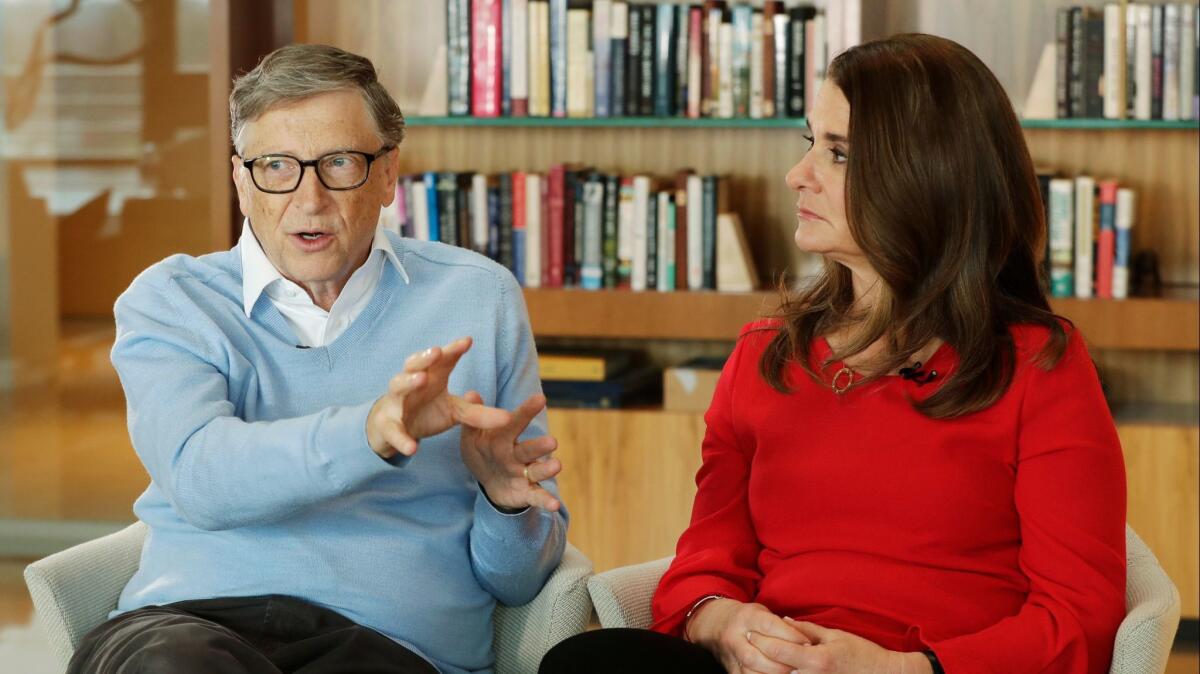Gates Foundation dumps ‘big idea’ approach to build on school progress in L.A. and elsewhere

- Share via
The education experts at the Bill & Melinda Gates Foundation used to be after the one “big idea” that could transform public school education. They tried breaking down large schools into smaller, more intimate communities. They tried using test scores to evaluate teachers.
Now experience seems to have taught them not to impose so much from outside. They want to create networks of schools that will work together, with help from experts, to solve problems — and then share strategies and research. A particular goal is keeping students on track year by year, all the way to graduation.
On Tuesday, the foundation awarded about $92 million in new grants — to 19 organizations in 13 states — that will reach schools in Los Angeles and across the country, but probably will bring with them less radical change and also less controversy than past efforts.
The central aim remains the same: to increase the number of black, Latino, and low-income students who earn a diploma, go to college and graduate with marketable skills.
And if the new approach sounds less sweeping or laser focused than those in the past, that’s partly the point.
“We’ve come to understand how important context is,” said Bob Hughes, the foundation’s director of K-12 education. “One size doesn’t fit all.”
The Seattle philanthropic institution is known for spending billions to transform public education. But even those billions don’t capture the extent to which the foundation has leveraged its influence to campuses in every corner of the country.
One such effort was to refashion large, impersonal middle and high schools into smaller academies. The results, in terms of improved student achievement, overall were lackluster. Later came a teacher-effectiveness initiative, which some critics and supporters characterized as a mission to find and fire bad teachers. Once again, the results were disappointing in terms of improving outcomes for students.
“Systems are as important as individual items or actors,” Hughes said.
An average person could become a “really good” teacher, he said, with great materials and training, helped by strong support from parents and the community, working in a safe school environment that meets children’s broader needs.
Great teaching is critical to learning, he said, “but a teacher can’t do it alone.”
Such lessons have come at a price, after schools and school districts across the country reshaped themselves based on the earlier reform thinking. In many cases, they were forced to do so by new state and federal policies and laws. (And in some cases, to be sure, the changes helped students.)
With the new grants, the foundation seeks to support educators doing work that already has shown progress.
The types of grants are varied, so measuring how much they help will be challenging.
A $499,000 grant will go to the KIPP national charter school network, which has schools in Los Angeles. KIPP’s leaders grew concerned because only 38% of students who completed their eighth-grade program or entered ninth grade were graduating from college. (For L.A. Unified, it is 12%.) Efforts to improve counseling and post-graduation support are improving these numbers. KIPP also has begun to tackle “under-matching,” when an Ivy League-caliber student, for example, enrolls in a community college.
A $16-million grant will go to Core Districts, a consortium of large California school systems that includes Los Angeles Unified, the nation’s second-largest district. Here, the effort will focus on keeping ninth-graders on track for graduation. The work will probably look at multiple factors that thwart students.
“It’s helping folks learn how to better understand the impact of their lessons and the work they’re doing,” said Rick Miller, Core’s executive director.
An organization called Teach Plus will use $619,000 to pair teachers and principals at five Los Angeles schools with their counterparts at five Chicago schools to collaborate on improving math skills for eighth-graders, said Sarah Lillis, executive director for Teach Plus California.
A $7.4-million grant in Dallas will go toward improving student writing. Supt. Michael Hinojosa said he’s been worried about stagnation in this area. The state’s writing test, he said, does not measure or develop advanced writing skills, which are central to learning.
“We’ve had continuous improvement,” he said. “We need quantum improvement.”
The foundation said it expects to hand out $460 million for this work over five years.
Twitter: @howardblume
UPDATES:
4:35 p.m.: This article was updated throughout with staff reporting.
This article was originally published at midnight.
More to Read
Sign up for Essential California
The most important California stories and recommendations in your inbox every morning.
You may occasionally receive promotional content from the Los Angeles Times.














